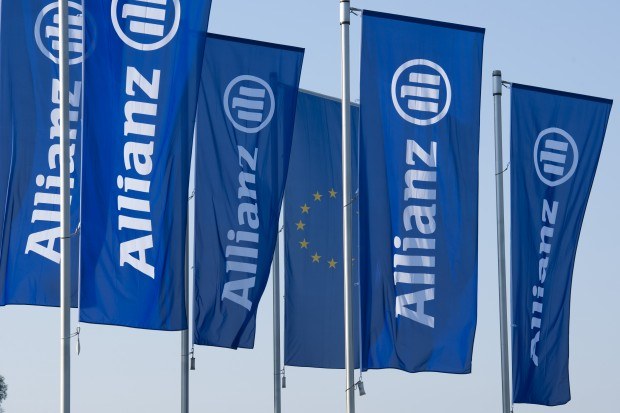Allianz SE reported a 23 percent increase in fourth-quarter net income and announced its first-ever share buyback as Europe’s biggest insurer makes good on a promise to return excess cash to shareholders.
Net income rose to 1.74 billion euros ($1.86 billion) in the fourth quarter from 1.42 billion euros a year ago, the insurer said late Thursday in a statement from Munich. Analysts had expected earnings of 1.62 billion euros, according to the average of seven estimates compiled by Bloomberg. The company plans to spend as much as 3 billion euros to repurchase shares over the next 12 months.
“What’s fantastic is the solvency ratio driven by disposals, capital generation and management measures,” said Michael Haid, an analyst at Commerzbank AG with a buy rating on the stock. “The good capital ratios mean that future buybacks are becoming more likely.”
Allianz, led since May 2015 by Chief Executive Officer Oliver Baete, had promised investors to pay out the company’s unused acquisition budget if it couldn’t find suitable deals. The 51-year-old CEO has been scouting for acquisitions over the past months, exploring a purchase of Australian insurer QBE Insurance Group Ltd. as well as parts of Assicurazioni Generali SpA, Italy’s biggest insurer, people familiar with the matter have said.
Following the buyback announcement, Allianz said going forward that half of net income will be used to finance growth if appropriate or returned to shareholders on a flexible basis. The company is targeting an operating profit from 10.3 billion euros to 11.3 billion euros this year, it said.
Allianz’s Solvency II ratio, a measure of an insurer’s ability to absorb losses under industry regulation introduced last year in the European Union, rose to 218 percent at the end of the year from 200 percent a year earlier.
Allianz shares rose 3.2 percent at 9:05 a.m. in Frankfurt on Friday. The stock has gained 25 percent in the past six months, compared with a 20 percent gain in the Bloomberg Europe 500 Insurance Index.
Buying back shares will help Baete meet a goal for earnings-per-share growth of 5 percent a year on average and an adjusted return on equity of 13 percent by 2018, as ultra-low interest rates, low prices for some insurance products and increased regulation weigh on insurers’ earnings in Europe.
Dividend Boost
Allianz’s biggest unit in terms of premium income is life and health, a business where low interest rates have eroded investment returns in recent years. Property and casualty insurance has been its most profitable division, but prices there are under pressure.
Baete hired Jacqueline Hunt last year to oversee the insurer’s U.S. life insurance unit and its $2 trillion asset management unit, which comprises Pacific Investment Management and Allianz Global Investors.
Clients added 5.9 billion euros in third-party assets at Pimco in the fourth quarter, Allianz said. Pimco’s cost-income ratio improved to 59.9 percent last year from 61.3 percent a year earlier, the insurer said in a presentation on its website. That compares with a target of less than 60 percent set by Allianz for 2016.
“The Pimco turnaround is on track,” Allianz Chief Financial Officer Dieter Wemmer said in the statement. “Cost cuts, especially in variable compensation, helped to make up for revenue declines and lift operating profit slightly in the quarter.”
While Pimco reported the second consecutive quarter of inflows, AGI had third-party net outflows of 4.2 billion euros as “net inflows in multi asset and alternatives could not fully compensate for net outflows from equity business.”
In addition to buying back shares, Allianz plans to increase its dividend payout to 7.60 euros a share for 2016 after paying 7.30 euros per share for 2015. That beat the Bloomberg Dividend Forecast, which was for an unchanged 7.30 euros a share.





















 Allianz Built an AI Agent to Train Claims Professionals in Virtual Reality
Allianz Built an AI Agent to Train Claims Professionals in Virtual Reality  20,000 AI Users at Travelers Prep for Innovation 2.0; Claims Call Centers Cut
20,000 AI Users at Travelers Prep for Innovation 2.0; Claims Call Centers Cut  Berkshire-owned Utility Urges Oregon Appeals Court to Limit Wildfire Damages
Berkshire-owned Utility Urges Oregon Appeals Court to Limit Wildfire Damages  Retired NASCAR Driver Greg Biffle Wasn’t Piloting Plane Before Deadly Crash
Retired NASCAR Driver Greg Biffle Wasn’t Piloting Plane Before Deadly Crash 



